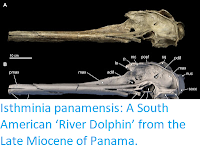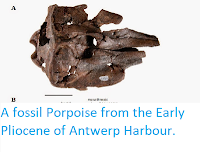The Lulworth Coastgaurd has reported a Dolphin stranding at Durdle Door on the coast of Dorset, southern England. The animal was reported on the morning of Friday 2 January 2020, causing the Coastgaurd to investigate, as Cetacean strandings fall within their remit. Upon arrival they found the animal was a Short-beaked Common Dolphin, Delphinus delphis, a species common in waters around the UK, which had died before being discovered. The death is not regarded as suspicious, Common Dolphins are quite commonly found on beaches in Europe and other areas, simply because they are abundant. The Coastgaurds took measurements and photographed the Dolphin, data that will be shared with the Natural History Museum and the UK Cetacean Strandings Investigation Programme, who both maintain databases of Cetacean strandings around the UK.
A Short-beaked Common Dolphin found on the beach at Durdle Door in Dorset, England, on 3 January 2020. Lulworth Coastguard.
Short-beaked Common Dolphins are abundant in temperate and warm temperate waters around the world, and to some extent in the tropics. They are not considered to be endangered globally, though some populations are protected as they are considered locally vulnerable, notably those in the the North Sea, Baltic Sea, Mediterranean, Black Sea and eastern tropical Pacific, which are all protected under the terms of the Convention on the Conservation of Migratory Species of Wild Animals.
See also...
Follow Sciency Thoughts on Facebook.







